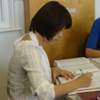Pay, Access and Learn
Buy packages
Please log in to buy packages or sign up for an account.
The following packages are available to buy when you create an account or sign in:

Approaches to learning
These resources will help you explore the approaches and general skills you need to be successful in academic study. They include resources to help you manage your time effectively, find the conditions that allow you to work best and deal with stress.
Introduction
This pack of 10 learning resources will help you to find out about the general skills and approaches you need to be successful in academic study. Key areas such as managing your time efficiently, and recognising the conditions that allow you to work best and deal with stress are addressed through a range of learning activities. All of the activities involve 'learning by doing', and include reflection, practice and feedback.
Learning objectives
• To inform the international student about the skills and approaches they will need in order to succeed in higher academic study
• To help the international student prepare for some of the general requirements of UK academic culture
• To help the international student develop useful strategies and approaches for study purposes
• To develop the international student's overall confidence in dealing with academic study in a further or higher educational context
• To help the international student develop their English language skills at the same time whilst studying through the medium of EnglishLanguage level
The resources are designed for students who have already demonstrated or consider themselves to have a higher intermediate to advanced level of English (IELTS 5.5 and above or equivalent; B2/C1 CEF).
Time
The 10 resources in this pack provide up to 7.5 hours of learning activity.
Contents
The best conditions for learning
Managing your study time
Identifying the academic skills you need
Recognising your own approach to study
Planning how to meet your workload
Active and reflective learning skills
Using tutor feedback to improve your work
Learning logs and reflective journals
Working with other people
Managing stress

Basic skills for academic writing
These learning resources focus on skills need for academic writing at the level of paragraph construction and connecting ideas together, ways of making reference to other writers' work and referring to data in writing.
Introduction
This pack of 10 learning resources will help you to find out about some of the basic skills needed for academic writing. Key areas include paragraph construction and how to connect ideas together, ways of making reference to other writer's work and referring to data in writing. All of the activities involve 'learning by doing', and include reflection, practice and feedback.
Learning objectives
• To help the international student prepare for academic writing in higher academic study
• To help the international student review and develop some of the basic skills needed for academic writing
• To help the international student develop their skill in referring to what they have read in the accepted way in written assignments
• To develop the international student's awareness of standard referencing conventions for academic writing
• To help the international student develop their skill in using and incorporating data in the form of graphs and tables in written assignmentsLanguage level
The resources are designed for students who have already demonstrated or consider themselves to have a higher intermediate to advanced level of English (IELTS 5.5 and above or equivalent; B2/C1 CEF).
Time
The 10 resources in this pack provide up to 7.5 hours of learning activity.
Contents
Structuring your writing
Improving your paragraphs with topic sentences
Expressing fact and opinion in writing
Using examples to support written statements
Typical language that academic writers use
Introduction to describing graphs and tables
Comparing data in graphs
Using quotations
Using paraphrase in writing
Compiling a reference list

More advanced skills for academic writing
These learning resources focus on more advanced skills for academic writing including interpreting essay title; quoting, paraphrasing and referencing, writing introductions and conclusions, adding cohesion, revising and presenting written work.
Introduction
This pack of 10 learning resources will help you review and develop more advanced skills for academic writing. Key areas include interpreting essay title; quoting, paraphrasing and referencing, writing introductions and conclusions, adding cohesion, revising and presenting written work. All of the activities involve 'learning by doing', and include reflection, practice and feedback.
Learning objectives
• To help the international student prepare for some more advanced skills needed for academic writing in higher academic study
• To help the international student develop analytical skills needed for interpreting essay titles for academic writing
• To help the international student review their skill in referring to what they have read in the accepted way in written assignments
• To develop the international student's awareness of the appropriate way in which to present academic written work
• To help the international student review how to produce effective introductions and conclusions and improve the cohesion of their academic writingLanguage level
The resources are designed for students who have already demonstrated or consider themselves to have a higher intermediate to advanced level of English (IELTS 5.5 and above or equivalent; B2/C1 CEF).
Time
The 10 resources in this pack provide up to 7.5 hours of learning activity.
Contents
Understanding essay titles
Introduction to quoting and paraphrasing
Identifying plagiarism and avoiding poor practice
Understanding reference lists and bibliographies
Describing trends and changes in graphs
The role of the introduction in academic writing
Writing an effective conclusion
Creating cohesion in your writing
Practice revising written work
Presenting your written work

Reading and critical thinking for study purposes
These learning resources focus on aspects of academic reading and critical thinking including reading skills (skimming, scanning, predicting, speed reading); note-taking and recognising fact, opinion and evidence in text.
Introduction
This pack of 10 learning resources will help you review and develop your academic reading and critical thinking skills. Key areas include reading skills (skimming, scanning, predicting, speed reading); note-taking and recognising fact, opinion and evidence in text. All of the activities involve 'learning by doing', and include reflection, practice and feedback.
Learning objectives
• To assist the international student in preparing for academic reading and critical thinking in higher education
• To help the international student develop a range of key reading skills for academic study
• To develop the international student's awareness of good practice in note-taking and how to avoid plagiarism
• To provide the international student with practice in analysing text and distinguishing fact, opinion and evidence when readingLanguage level
The resources are designed for students who have already demonstrated or consider themselves to have a higher intermediate to advanced level of English (IELTS 5.5 and above or equivalent; B2/C1 CEF).
Time
The 10 resources in this pack provide up to 7.5 hours of learning activity.
Contents
Introduction to reading skills
Prediction strategies for reading
Introduction to speed reading
Introduction to scanning
Scanning for specific information
Reading to identify main points
Skim-reading practice
Reading and critical thinking
Good practice in note-taking to avoid plagiarism
Recognising fact, opinion and evidence in text

Listening and note-taking skills for study purposes
These learning resources focus on listening practice and note-taking skills for lectures and other academic listening contexts.
Introduction
This pack of 10 learning resources will help you to find out about some of the basic skills needed for listening and note-taking. Key areas include preparation and practice in listening and note-taking for academic purposes. All of the activities involve 'learning by doing', and include reflection, practice and feedback.
Learning objectives
• To help the international student prepare for listening and note-taking for higher academic study
• To help the international student develop good practice when listening to and taking notes from lectures
• To help the international student develop their skills in listening closely, predicting and identifying key points in lectures and presentations
• To provide the international student with practice in listening to complex descriptions and data
• To help the international student develop their confidence in listening situations in higher educational contextsLanguage level
The resources are designed for students who have already demonstrated or consider themselves to have a higher intermediate to advanced level of English (IELTS 5.5 and above or equivalent; B2/C1 CEF).
Time
The 10 resources in this pack provide up to 7.5 hours of learning activity.
Contents
How to take good notes while listening
Prediction skills for listening
Using clues to understand lectures
Listening closely to presentations
Listening for signposting language
Practising listening skills for lectures
Listening for key points in a science lecture
Recording data
Listening to a complex description
Listening to understand more difficult language

Speaking and communicating for study purposes
These resources focus on speaking in seminars; aspects of pronunciation, giving an oral presentation, polite communication and appropriate email style.
Introduction
This pack of 10 learning resources will help you to prepare for speaking in an academic context. Key areas include communicating effectively in seminars, giving oral presentations, and improving aspects of pronunciation. All of the activities involve 'learning by doing', and include reflection, practice and feedback.
Learning objectives
• To help the international student prepare for some of the general requirements of speaking in an academic context
• To inform the international student about the appropriate use of online channels of communication in a higher academic environment
• To help the international student prepare for speaking in seminars and making oral presentations in class
• To help the international student develop aspects of their pronunciation in English
• To develop the international student's overall confidence in communicating in academic contextsLanguage level
The resources are designed for students who have already demonstrated or consider themselves to have a higher intermediate to advanced level of English (IELTS 5.5 and above or equivalent; B2/C1 CEF).
Time
The 10 resources in this pack provide up to 7.5 hours of learning activity.
Contents
Communicating in seminars
Listening and speaking in seminars
How to deliver an oral presentation
Speaking without hesitating
Sound linking in speech
Word and sentence stress
Unstressed aspects of pronunciation
Contractions in speech
Communicating online
Communicating politely across cultures

Grammar for study purposes (Part 1)
These learning resources focus on basic aspects of grammar for study purposes, including sentence construction, articles, verbs and tense use.
Introduction
This pack of 10 learning resources will help you review and develop some basic grammar skills for academic contexts. Key areas include sentence construction, articles, verbs and tense use. All of the activities involve 'learning by doing', and include reflection, practice and feedback.
Learning objectives
• To help the international student review and develop their grammar skills, particularly for use in academic written contexts
• To help the international student review modal verb use and tenses in English
• To develop the international student's awareness of sentence construction and their ability to form good sentences in English
• To provide the international student with practice in using articles correctly in EnglishLanguage level
The resources are designed for students who have already demonstrated or consider themselves to have a higher intermediate to advanced level of English (IELTS 5.5 and above or equivalent; B2/C1 CEF).
Time
The 10 resources in this pack provide up to 7.5 hours of learning activity.
Contents
The sentence
Simple and more complex sentences
Reviewing verb groups
Understanding choice of tense
Structures for expressing purpose
Language and grammar for cause and effect
When to use an article with a noun phrase
Assessing yourself on articles
Modal verbs and their meanings
Introduction to hedging or cautious language

Grammar for study purposes (Part 2)
These learning resources focus on more advanced aspects of grammar for study purposes, including impersonal style, emphasis and cautious language.
Introduction
This pack of 10 learning resources will help you review and develop some higher level grammar skills for academic contexts. Key areas include aspects of style and punctuation, forming complex noun phrases and cautious language. All of the activities involve 'learning by doing', and include reflection, practice and feedback.
Learning objectives
• To help the international student develop their skill in forming complex noun phrases for academic writing
• To help the international student review a range of grammatical devices for expressing caution in academic writing
• To develop the international student's awareness of style in academic writing and the means of achieving an impersonal style
• To provide the international student with a review and practice in using punctuation appropriatelyLanguage level
The resources are designed for students who have already demonstrated or consider themselves to have a higher intermediate to advanced level of English (IELTS 5.5 and above or equivalent; B2/C1 CEF).
Time
The 10 resources in this pack provide up to 7.5 hours of learning activity.
Contents
Impersonal style and the passive form
Forming complex noun phrases
Verbs followed by gerunds or infinitives
Modal verbs in writing
Recognising and using cautious language
Reviewing dependent prepositions
Using noun phrases instead of clauses
Changing the emphasis in a sentence
Reviewing punctuarion
Using colons and semi-colons

Vocabulary for study purposes
These resources focus on developing a vocabulary suitable for academic purposes.
Introduction
This pack of 10 learning resources will help you to develop your vocabulary for academic purposes. Key areas include reviewing vocabulary in use through concordances, abstract vocabulary and style, phrasal verb and idiomatic language. All of the activities involve 'learning by doing', and include reflection, practice and feedback.
Learning objectives
• To help the international student build their vocabulary for academic purposes
• To inform the international student about abstract vocabulary and its relationship to academic style
• To help the international student explore academic vocabulary in use through concordancing
• To help the international student develop aspects of their pronunciation in English
• To help the international student review the use of phrasal verbs and idiomatic languageLanguage level
The resources are designed for students who have already demonstrated or consider themselves to have a higher intermediate to advanced level of English (IELTS 5.5 and above or equivalent; B2/C1 CEF).
Time
The 10 resources in this pack provide up to 7.5 hours of learning activity.
Contents
Introduction to vocabulary learning
Building your vocabulary
Concordancing for vocabulary development
Language for classifying
Forming words with prefixes and suffixes
Confusable words
Introduction to abstract vocabulary
Stylistic effects of abstract vocabulary
Phrasal verbs
Using idiomatic language
- Follow:
 eLanguages on LinkedIn
eLanguages on LinkedIn eLanguages on Facebook
eLanguages on Facebook e_languages on Twitter
e_languages on Twitter elanguages_ on Instagram
elanguages_ on Instagram
Contact us at elang1@soton.ac.uk
© 2003-2026 eLanguages, University of Southampton. All rights reserved.

